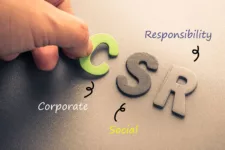One of the things that caught my eye this month was that Cisco ranked 1st in Barron’s sustainability study. They ranked 3rd in Corporate Knights’ similar ranking announced in 2017, they dropped to 7th in 2018 but still are the top ranked US company in that world ranking. It is also fascinating that while Barron’s report had several tech companies in the top 10, Corporate Knights was far more diverse and, other than Cisco being in the top 10 in both, there was little additional correlation between the reports. One reason for this is that the Corporate Knights report looks at companies internationally, but Barron’s only looks at the US, but even taking that into account, it is fascinating that only Cisco, as a tech company ranked highly in both reports.
What I also think is fascinating is that both reports look at far more than what we normally group under sustainability. In both cases the judging organizations also look at diversity, management competence and performance, and other items that we more normally connect with good governance than we typically connect with sustainability.
But, I think, this approach is right because sustainability makes no real sense if the company is poorly run, inefficient or unlikely to survive. Sustainability should not only mean strong ecological focus and execution, but strong execution in general operations because, if the firm doesn’t survive then neither will their environmental efforts. More importantly, firms emulate other successful firms, and being both successful and good for the environment should create a multiplicative impact on the market as other firms emulate Cisco for economic benefit. The message is that Cisco isn’t successful despite their sustainability and diversity focus, but because of it.
Let’s look at a couple interesting aspects of Cisco’s focus and recognition.
Importance
One of the reasons rankings like this are important is because Millennials value them highly. In addition, Millennials seem to be increasingly able to see through companies that are gaming the system and get credit for either buying results or doing very limited efforts like tree planting that are unrelated to operations. Once a company gains their trust they tend to favor that company and Millennials are fast becoming the leading consumer of technology both individually and as corporate decision makers.
Millennials are also far broader in their interests than their predecessors focusing on far more than just the more typical green initiatives. They want to see meaningful diversity, not just token diversity common in entry level jobs, but diversity in executive management. In short, and this is somewhat ironic, the generation that came up with Fake News, want the companies they work with to be sincere and honestly focused on making their firms and the world a better place not just giving the related projects lip service and token efforts.
In short, the ranking Cisco worked to achieve has likely placed the firm in the lead for most anything a Millennial is considering buying, and given Millennials are the coming power buyer group, that should significantly help Cisco keep their industry dominance.
Cisco Execution
Leading the charge at Cisco is Tae Yoo who has a passionate focus on driving this effort. I spent some time chatting with her after I saw Cisco’s ranking and Cisco’s progress in this area is truly amazing. For instance, in the traditional areas they have dropped their Scope 1 and 2 greenhouse gas emissions by 41% and increased their use of renewable energy to 80% over the last decade.
What is also interesting is that much of this effort wasn’t the result of building their own solar farms but in shifting their electricity purchases from more traditional generators to solar and wind farms. This has a far broader impact because it makes those facilities more economically viable providing better Green energy alternatives for both residential and commercial electrical users. In short, by not just doing this for themselves they are helping large solar projects to become viable more quickly which should result in a far greater positive impact on the environment.
Unlike most technology companies which show progress in entry level diversity but are still largely white male run at the top, Cisco focused on fixing executive management and currently lead the segment with diversity at executive levels. You can’t drive real diversity if executive management isn’t itself diverse, a very common problem in tech and one that leads to the issues highlighted in the book Brotopia (a book every person who works for, in, and invests or buys tech should read). But when you embrace diversity at the top that is diversity where it matters, and it is not only more sustainable it creates a far better environment for a diverse workforce.
Other projects, that are part of the firm’s CSR strategic social investment portfolio and are fascinating were water well monitors in Africa which assured that not only were the wells safe but if the pumps broke they would be fixed timely substantially improving the quality of life there. They are also supporting an entrepreneurial organization with a very low cost neonatal cap which will better assure the safety of newly born children in Uganda. In addition, the company donates hundreds of millions of dollars of in-kind contributions to education each year for existing and emerging markets to help advance these markets over time and reduce what is often an unsustainable unemployment rate in some these regions.
This focus on making the world a better place isn’t just corporate, but it permeates the employees in the firm who put in hundreds of hours of community service on average a year. I’ve often seen efforts like this fail over time due to lack of support from the CEO, as you can see from Cisco’s own report, Chuck Robbins is heavily invested in this effort which likely speaks to why Cisco ranks consistently higher than any other tech firm in sustainability.
Wrapping Up:
Sustainability should be a high priority but often it gets lip service in US firms which is why they traditionally don’t rank well in international reports. Cisco is the exception and they are this exception because this effort has strong champions in Chuck Robbins and Tae Yoo, and the effort is broadly shared by the Cisco employees who vigorously support it. In this world where tech companies are often called out for bad practices, a lack of diversity, and even sexual harassment it is good to see one firm stand up for doing the right thing. Cisco’s ranking at the top of the sustainability class is well deserved and their example should not only make tech a better place to work for an increasingly diverse workforce but make the world a better place to live. Here is hoping a lot more firms, both domestic and foreign, learn from Cisco and follow their example. Our futures will depend on it.








